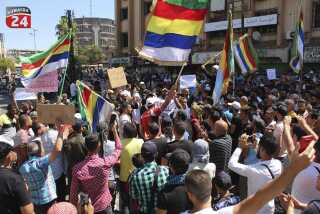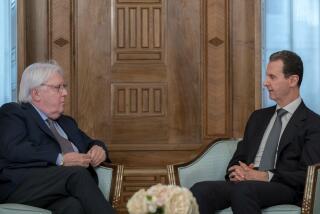Arab League gives Syria 3 days to end ‘bloody repression’
Reporting from Beirut — Arab foreign ministers Wednesday gave Syria three days to cease what one league official called its “bloody repression” against its people or face economic sanctions, the latest sign of President Bashar Assad’s growing isolation.
The move by ministers meeting in Rabat, Morocco, came as Syria’s humiliating suspension from the Arab League became effective. The 22-member organization on Saturday decided it would suspend Syria by Wednesday if it did not implement a league-brokered peace plan.
Arab states had “reached the end of the line” with the “bloody repression” by Assad’s government, Sheik Hamad bin Jassim al Thani, the foreign minister of Qatar, told reporters in Rabat.
Syria, which has called the suspension illegal and a product of U.S. pressure, boycotted the Morocco meetings, its chair sitting empty. The country is a founding member of the Arab League and considers itself “the beating heart of Arab nationalism.”
The league’s decision to suspend Syria, an unusually robust action by an alliance often criticized as feckless and irrelevant, was a blow to national prestige and prompted mass demonstrations by Assad loyalists, some of whom attacked the foreign missions of Saudi Arabia, Qatar, Turkey and France.
France recalled its ambassador from Damascus, the Syrian capital. There were also reports of attacks on other foreign missions, including the embassies of Morocco and the United Arab Emirates.
Syria has apologized for the attacks and vowed to beef up security at foreign missions.
Arab ministers have accused Syria of failing to implement the peace plan, which includes a cease-fire, the release of political prisoners and a dialogue with the opposition. The league plans to send an observer mission to Syria.
Damascus maintains that it is implementing the blueprint and has released more than 1,600 prisoners.
Assad has found himself ever more isolated as Arab nations and former allies such as Turkey have assailed his handling of the crisis, while international sanctions and unrest have battered Syria’s economy.
Some fear Syria, strategically situated in the heart of the Middle East, could be sliding toward civil war as clashes between security forces and armed rebels appear to be on the increase. Despite the opposition protests, Assad still maintains considerable support, especially among minorities fearing a civil war and in major cities such as Damascus, Aleppo and Latakia.
The opposition says November could be the bloodiest month since the revolt began in mid-March, with the number killed by security forces approaching 400. The United Nations blames a “brutal” government crackdown for the deaths of at least 3,500 people in the unrest.
Meanwhile, opposition activists said Wednesday that armed defectors had mounted a daring attack on a Syrian military intelligence headquarters on the outskirts of Damascus.
There was no comment from the Syrian government and no independent confirmation of the reported attack on the Air Force intelligence facility in Harasta. If true, the reported strike could represent a new escalation in the uprising against the Assad government. Damascus has been relatively quiet during the revolt.
An official with a group called the Free Syrian Army said 10 to 15 rebels penetrated the base and burned the building. They had defected only a few hours before the attack, said the official, who operates along the Lebanese-Syrian border and asked not to be named for security reasons.
Syria has restricted access to journalists, making it almost impossible to verify assertions of attacks and casualties.
The Syrian government says armed “terrorists” have killed more than 1,000 security personnel.
The Syrian uprising gained broad backing as an “Arab Spring”-inspired protest movement intent on bringing democracy to a nation ruled for more than 40 years by the Assad family. Observers say reports of an armed insurgency could mar the opposition’s peaceful image outside Syria, costing it international support.
An armed opposition “plays into Assad’s and his regime’s hands” and takes the country down “a very dangerous path,” Mark Toner, a deputy State Department spokesman, said Wednesday. The United States and other Western nations have called for Assad to step down.
“This was a peaceful movement in its inception and it’s only because of the regime’s repeated and brutal campaign of violence against innocent protesters that we’re seeing the country move down this very dangerous path,” Toner said. “We don’t condone violence, not on the part of the Syrian military, the Syrian regime, nor on the part of the opposition.”
Special correspondent Alexandra Sandels contributed to this report.
More to Read
Sign up for Essential California
The most important California stories and recommendations in your inbox every morning.
You may occasionally receive promotional content from the Los Angeles Times.









